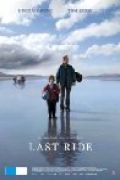
Directed by
Glendyn Ivin
90 minutes
Rated M
Reviewed by
Sharon Hurst

Last Ride
Synopsis: Kev (Hugo Weaving) is a petty crook on the run from something when we meet him on the road, driving with his ten-year-old son Chook (Tom Russell). They visit Kev’s old girlfriend, steal several cars, and end up in a South Australian National Park near the Flinders Ranges. Through a series of memories and flashbacks, we gradually discover what has happened, as well as being witness to a strong but painful relationship between father and son.Based on an award-winning novel by Denise Young, Last Ride is the capturing of an experience, achieved by actually taking the cast and crew on a 5000km journey into the country travelled by Kev and Chook. What this means for audiences is a strong sense of immediacy with the spectacular landscape integral to the story.
The character of Kev will be a hard one for audiences to empathize with at first. He is the scoundrel son of a hardline father and although he obviously loves Chook deeply, he is prone to violent outbursts and sometimes treats the child harshly. His petty crimes see him shoplifting, stealing food from holiday-makers’ caravans, and co-opting one car after another with no evident concern for their owners,. It is to Weaving’s credit that he enables us eventually to feel deeply for Kev. Weaving is now a veteran of a wide variety of films and while I’ve always thought him excellent, here he positively excels himself with a career-defining performance, embodying anger, pain, despair and love, all in the one very rough package.
Young newcomer Russell does an outstanding job as Chook whose story this effectively is and there is a small but significant performance by a well-known face from Australian TV, John Brumpton, who plays Max, a friend to Kev and Chook and whom we get to know in flashbacks as the film progresses.
The major thrust of Last Ride is an exploration of the bond between father and son. Despite Chook’s growing awareness that his father is leading them deeper and deeper into trouble and the fact that Kev does some reprehensible things to the boy there is the sense of an abiding bond between them.
Other themes are briefly touched upon. Early on, the pair wind up in a South Australian Afghan heritage museum and Kev reveals that he and Chook have a motley lineage, probably mixed Aboriginal and Afghan. When the pair end up in Arkaroo National Park, the local indigenous park rangers bring in another allusion to the "ownership" of the land and the white man's historically alienated relationship to it.
The landscape itself is used to stunning effect in this film. Greig Fraser’s cinematography is dazzling. In one scene especially, Kev and Chook drive across what seems to be a shallow lake or salt pan – it stretches for miles and this image with its translucent light is simply stunning. In many scenes the magnificent Australian sunrise is captured, making us feel repeatedly that this could be the dawn of a better day, but each day just brings fresh disappointment and bad experiences for the troubled travellers.
A debut feature film for director Glendyn Ivin, Last Ride tells a story of damaged people, which on one level connects it to darker Australian films like The Chant Of Jimmie Blacksmith (1978) but there is also a feeling of hope at its end that the cycle of abuse can be transcended, even if at a great cost. Last Ride is one of the finest Australian films of this, or any, year.

Want more about this film?


Want something different?




